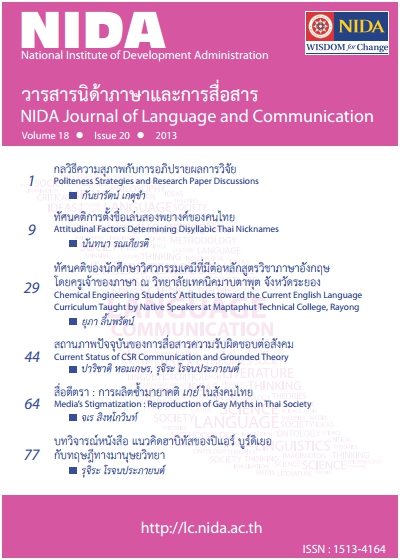Attitudinal Factors Determining Disyllabic Thai Nicknames
Keywords:
disyllabic nicknames, first pronounsAbstract
The objective of the research paper titled, “Attitudinal Factors of Determining Disyllabic Thai Nicknames,” is to study the logic and contributing factors behind contemporary Thai guardians’ behaviour of giving their children a disyllabic nickname, revealing Thai attitude towards choosing a nickname.
A survey seeking information on why a dysllabic nickname for a child might be chosen was sent out to guardians of kindergarten and primary school students. The results indicate that amongst those surveyed, 48.33% of kindergarten students in year 2 and 47.34% of the overall number in year 3 have a disyllabic nickname. This is significantly higher than primary school students in years 5 and 6 in which only 38.37% and 30.71% of the overall numbers, respectively, have a disyllabic nickname. The results register a growing trend to give a child a disyllabic nickname, contrasting with past custom.
In addition, it was discovered that one of the guardians’ desire to give their children a name with a desirable meaning is one of the main reasons a disyllabic nickname is chosen. Other reasons for the choice include that the children tend to lose them if a syllable is dropped and the desire for a unique sounding nickname. However, it was also observed that despite having got a disyllabic nickname, a particular child when addressing him/herself would still pick out only one of the two syllables to be used in place of the first person pronoun.
Downloads
How to Cite
Issue
Section
License
By submitting a manuscript, the author transfers the copyright for the article to School of Language and Communication, National Institute of Development Administration (NIDA), if and when the manuscript is accepted for publication. Though the journal is an open-access, reproduction of any material published in NIDA Journal of Language and Communication for non-personal and/or commercial purpose requires a written permission from School of Language and Communication, National Institute of Development Administration (NIDA).






